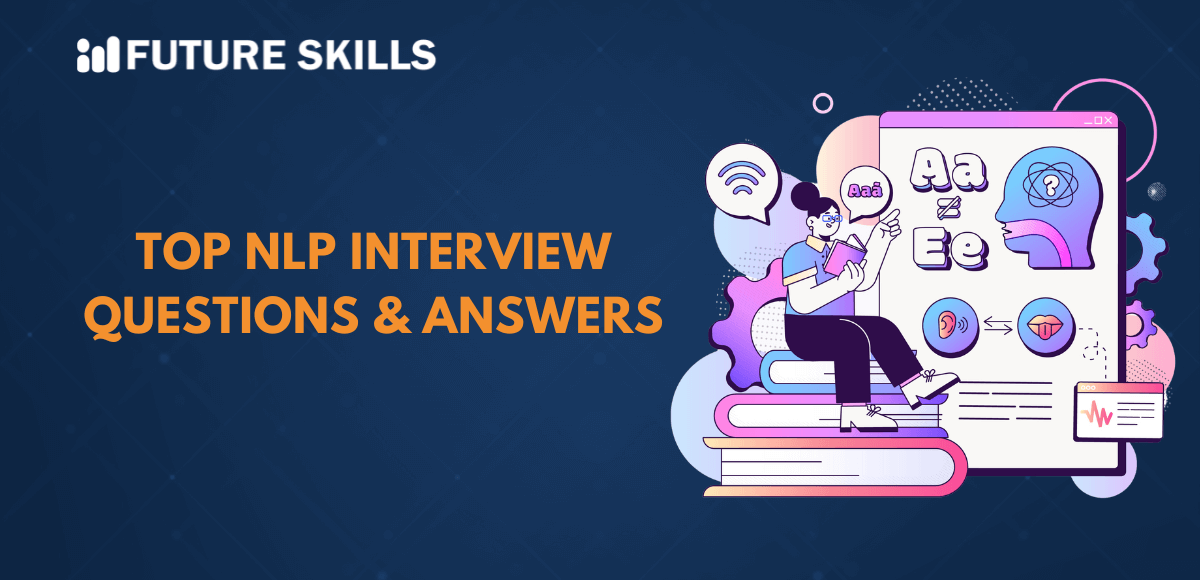Artificial intelligence has transformed the conventional ways of doing simple tasks that required human efforts. One of the notable areas in which AI has made notable strides is natural language processing or NLP. Without NLP, you cannot expect AI systems to understand human queries and instructions accurately. You are here to learn the best NLP interview questions and find their answers before your next interview. The rewards in a career with expertise in NLP must have encouraged you to look for interview questions and answers. Let us find the most important NLP interview questions that you must learn to enhance your confidence.
Enroll in our unique AI Certification Course and reach your career goals by mastering the best and latest AI techniques.
Most Popular NLP Interview Questions
The AI labor market has become a hotbed of new job opportunities for professionals skilled in AI, machine learning and natural language processing. As the demand for AI technologies continues growing, skilled experts have become an invaluable resource. Any professional capable of using NLP in their jobs can earn an average annual salary ranging up to $175,000. You must take a look at the following NLP interview questions after completing professional training to earn the important skills.
Basic NLP Interview Questions and Answers
The first set of questions in an interview for NLP jobs will revolve around the fundamental concepts. Anyone seeking an easy answer to queries like ‘How to crack an NLP interview?’ must begin with the basic questions. The following interview questions will test your proficiency in the fundamentals of natural language processing.
1. Can you explain the significance of NLP?
Natural language processing is a subdomain of artificial intelligence that focuses on enabling interactions between humans and machines. The significance of NLP stems from its ability to bridge the communication gap between computer systems and humans. NLP helps machines in understanding and interpreting natural language that enables them to interact with humans in a more intelligent manner. Natural language processing involves the use of machine learning algorithms to extract important information from spoken or typed language.
2. What is a ‘Corpus’ in NLP?
The most common natural language processing interview questions in the initial stages of interviews will test your knowledge of important NLP components. Corpus is a crucial element in the working of NLP as it offers a structured dataset to help machines in learning natural language. The primary purpose of corpus in NLP is to offer the foundation for learning insights on language patterns, developing language models, and implementation of linguistic analysis.
3. Do you know what’s inside an NLP pipeline?
The NLP pipeline is a collection of steps that can help in solving NLP problems. Every NLP pipeline begins with text collection through web scraping or available datasets. The next steps involve cleaning text, representing the text, word embedding, and representing the sentences. NLP pipelines also involve training the model through regression techniques or neural networks. Subsequently, the model must go through comprehensive evaluation and adjustments before deployment.
4. How can you achieve feature extraction in NLP?
Feature extraction is an important process in natural language processing as it involves identifying the key words and phrases for different categories. The feature extraction phrase enables tokenization of certain words or phrases in the category of positive reviews. The applications of feature extraction can help in expanding the use of NLP for sentiment analysis.
5. Where will you find data for NLP projects?
Interviewers are likely to search for candidates with the ability to put their skills to use in real-world scenarios. Some of the top NLP interview questions will test your knowledge of how NLP projects work in real life. Data collection is an important step to establish the foundation of NLP projects and you can follow different approaches to obtain necessary information. You can rely on publicly available datasets, scrape data from different websites, or use data augmentation on existing datasets to collect data for NLP projects.
6. Do you know anything about NLTK?
NLTK or Natural Language Processing Toolkit is a collection of Python libraries and programs to facilitate statistical and symbolic natural language processing. The importance of NLTK revolves around its capabilities to offer tokenization, lemmatization, stemming, named entity recognition, classification, semantic reasoning, POS tagging and parsing. You can use the broad spectrum of features in NLTK for different NLP projects without any obstacles.
7. Can you explain Named Entity Recognition?
Named Entity Recognition is a critical component in natural language processing for identifying and classifying named entities in text. A named entity could be any real-world object, person, organization, date, or location. The most interesting thing about Named Entity Recognition or NER is the challenge of different ways for representation of named entities. NER focuses on extraction and classification of named entities for obtaining structured data about entities in a specific text.
8. What are the top examples of NLP applications?
Before moving towards the advanced NLP interview questions, interviewers will test your knowledge on other important aspects. The most notable examples of NLP applications in the real world include chatbots and online translation services. Chatbots use natural language processing to enhance customer service interactions with better cost reduction and efficiency. You must have noticed how Google Translate has become better at translating spoken and written text into different languages.
9. What is the role of semantic analysis in NLP?
Semantic analysis is the heart of natural language processing as it emphasizes the interpretation of human language. The working of semantic analysis involves different algorithms and techniques for understanding the words, sentences and phrases in a text. Semantic analysis helps computers in understanding human language like another human would. It can empower machines to understand relationships between words in a sentence and the context in a specific text.
10. What is parsing in NLP?
Parsing is an important process in NLP that helps in understanding the grammatical structure of a particular document. NLP applications implement parsing on text in a document by determining the connection between different words and phrases. It is important to note that the outcomes of parsing will be different for different sets of text. The primary goal of parsing revolves around understanding the grammar and the intent of the writer or speaker.
Get valuable insights and understand the fundamentals of AI comprehensively with our AI for Everyone Free Course. Enroll now!
Technical NLP Interview Questions and Answers
The next category of natural language processing interview questions will dive deeper into the technical aspects of NLP. You can solidify your reputation as a professional NLP expert by answering the advanced technical interview questions with confidence. Candidates can expect the following questions in the advanced stages of interviews for NLP jobs.
11. Can you tell us about the important metrics for NLP models?
The most important metrics used for NLP models include accuracy, recall, precision and F1 score. Accuracy serves as the ideal metric for NLP models with discrete output variables. Precision helps in determining how the model’s predictions align with the expectations and recall showcases the effectiveness of NLP models in recalling the positive class. The F1 score metric blends precision and recall to provide an accurate measure of the tradeoff between recall and accuracy.
12. What are the limitations of the bag of words model?
The bag of words model is a fundamental approach in NLP tasks that focuses on presence and frequency of words rather than the order and syntax. You can find four important steps in the working mechanism of bag of words model. The model offers a simplistic approach for interpretation of natural language albeit with some limitations. The bag of words model may ignore certain aspects of speech and subtleties in language. It may also struggle to deal with spelling variations or new words.
13. How can you use latent semantic indexing in NLP projects?
The best NLP interview questions in the technical rounds will also focus on concepts like latent semantic indexing or LSI. Latent semantic indexing is a mathematical approach to improve accuracy in information retrieval tasks. It serves as a useful resource to discover hidden relationships between words by creating different concepts related to a phrase. LSI is an ideal pick for any NLP project that involves small collections of static documents.
14. Do you know anything about ensemble methods in NLP?
Ensemble methods in NLP can help in deriving an output or making predictions through combination of different independent models with similarities or differences. You can also create an ensemble method with the combination of different models like logistic regression, random forest, and SVM. Ensemble methods help in overcoming the problems of noise, bias, and variance that may have a negative impact on machine learning models.
15. Can you explain the importance of attention mechanism in NLP?
The list of advanced NLP interview questions will also focus on the importance of topics like attention mechanism. Attention mechanism is useful in natural language processing as it involves the use of structured or sequential data. Attention mechanisms help in improving the ability of NLP models to manage complex dependencies and relationships in the data.
Deep dive into the world of ChatGPT and learn how to use it to your advantage effectively with our Certified ChatGPT Professional (CCGP)™ Course.
Final Thoughts
The promise of lucrative rewards in a career as NLP professionals has encouraged many people to learn natural language processing. You can use the interview questions and answers illustrated here to prepare for your next interview. It is important to remember that NLP interview questions and answers will only help you after you complete a comprehensive training process. Choose the best resources on natural language processing and prepare for your next NLP job interview right now.







